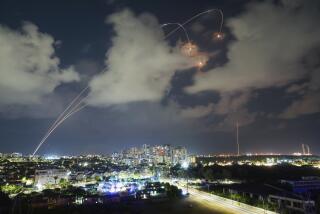Missile ‘Over-Optimism’
- Share via
An independent panel appointed by the Defense Department issued warnings this week about a proposed multibillion-dollar missile defense system that should command the attention of President Clinton. The panel’s recommendations suggest that there are more than a few bugs to be worked out.
Citing “a legacy of over-optimism” among some of the system’s proponents and a history of disappointments with earlier missile defense projects, the panel recommends delaying deployment until major technical and management problems are overcome. It’s eminently sound advice, aimed at keeping billions of dollars from being squandered and at ensuring that a missile defense system, when deployed, will work.
Long advocated by congressional conservatives and more recently embraced by the Clinton administration, the National Missile Defense system has a limited purpose. President Ronald Reagan’s abandoned Strategic Defense Initiative--labeled “Star Wars” by its critics--was intended to protect against an attack by masses of Soviet missiles. The new system would deal with the threat of a few missiles at a time. It is a response to the danger that “rogue” states--North Korea, Iran, perhaps Iraq--might someday launch a handful of missiles against the United States. Intelligence agencies think that threat has increased.
Space-based satellites would be used to detect missile launchings, which would then be tracked by ground-based radar. About 20 interceptor missiles, probably based in Alaska, would carry the “kill vehicles” required to destroy the attackers. Absolute accuracy is imperative: The 120-pound kill vehicle must strike the incoming warhead at supersonic speeds. Last month saw the first successful intercept test of a prototype vehicle. Others are scheduled.
A single successful test, while encouraging, leaves the total system a long way from proven. Technical obstacles remain, and politically imposed deadlines won’t reduce the time and effort needed to make things work. No security would be achieved by deploying a missile system that could fail.
Russia and China bitterly oppose the projected system, claiming it’s really designed to offset their missile arsenals. Moscow also refuses to amend the Anti-Ballistic Missile Treaty, which it signed with Washington in 1972. Among other things, the treaty prohibits testing surface-to-air missiles that are meant to destroy other missiles. The United States rightly insists that Russia has no veto over U.S. self-defense measures.
The ABM treaty can be abrogated with six months’ notice. First, though, there has to be compelling evidence that the proposed antimissile system will do what it’s supposed to do.
More to Read
Sign up for Essential California
The most important California stories and recommendations in your inbox every morning.
You may occasionally receive promotional content from the Los Angeles Times.













